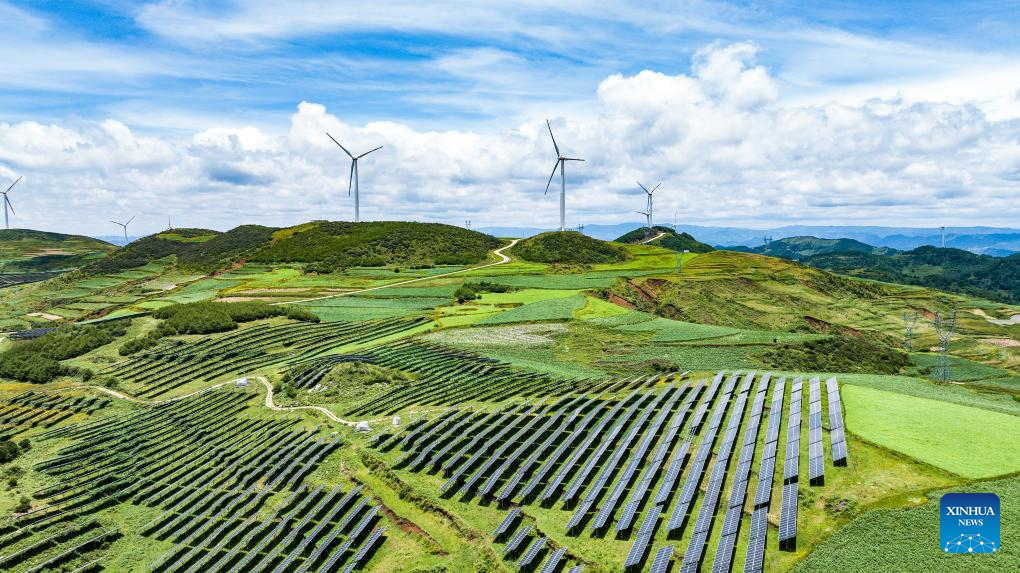
An aerial drone photo taken on July 3, 2025 shows a solar power station for agricultural use in the Yi-Hui-Miao Autonomous County of Weining, southwest China's Guizhou Province. In recent years, Guizhou has made significant progress in ecological construction, striving to transform ecological advantages into developmental strengths.
While actively developing green energy sources such as wind and solar power, Guizhou makes full use of the land beneath photovoltaic panels to cultivate crops, and meanwhile encourages farmers to engage in agricultural planting by leveraging diverse terrain and varied climate, an effort to enhance farmers' income.
Currently, Guizhou's forest coverage rate stands at 63.3 percent, and its green economy accounts for 48 percent of the province's overall economic composition. (Xinhua/Tao Liang)
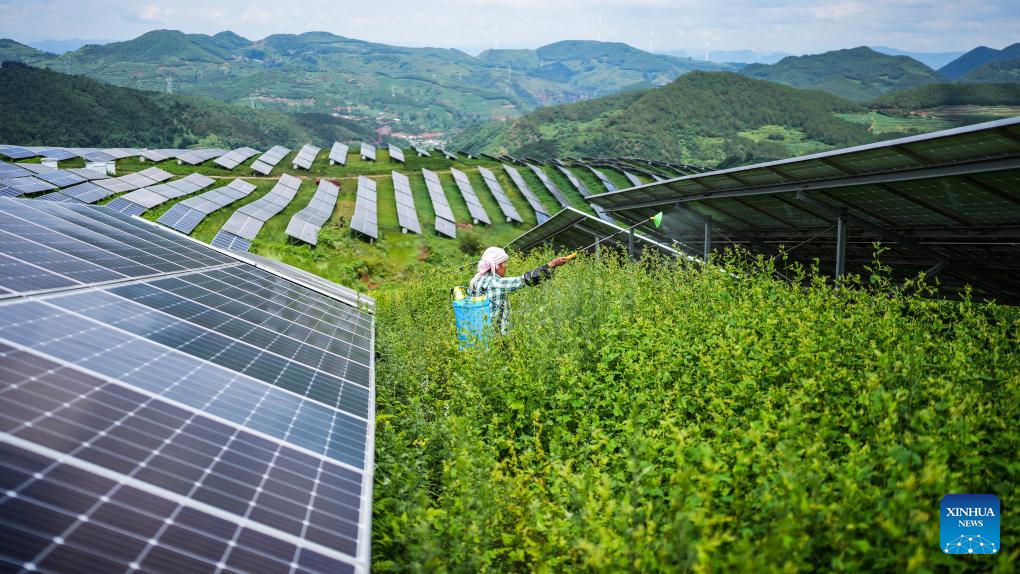
A farmer works amid photovoltaic panels at a solar power station in the Yi-Hui-Miao Autonomous County of Weining, southwest China's Guizhou Province, July 3, 2025. In recent years, Guizhou has made significant progress in ecological construction, striving to transform ecological advantages into developmental strengths.
While actively developing green energy sources such as wind and solar power, Guizhou makes full use of the land beneath photovoltaic panels to cultivate crops, and meanwhile encourages farmers to engage in agricultural planting by leveraging diverse terrain and varied climate, an effort to enhance farmers' income.
Currently, Guizhou's forest coverage rate stands at 63.3 percent, and its green economy accounts for 48 percent of the province's overall economic composition. (Xinhua/Tao Liang)
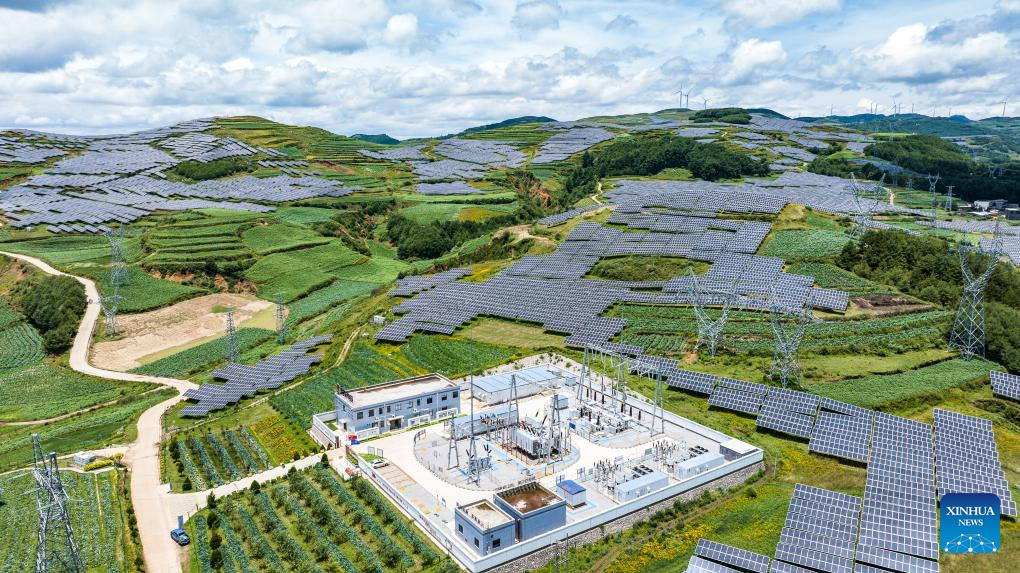
An aerial drone photo taken on July 3, 2025 shows a solar power station for agricultural use in the Yi-Hui-Miao Autonomous County of Weining, southwest China's Guizhou Province. In recent years, Guizhou has made significant progress in ecological construction, striving to transform ecological advantages into developmental strengths.
While actively developing green energy sources such as wind and solar power, Guizhou makes full use of the land beneath photovoltaic panels to cultivate crops, and meanwhile encourages farmers to engage in agricultural planting by leveraging diverse terrain and varied climate, an effort to enhance farmers' income.
Currently, Guizhou's forest coverage rate stands at 63.3 percent, and its green economy accounts for 48 percent of the province's overall economic composition. (Xinhua/Tao Liang)
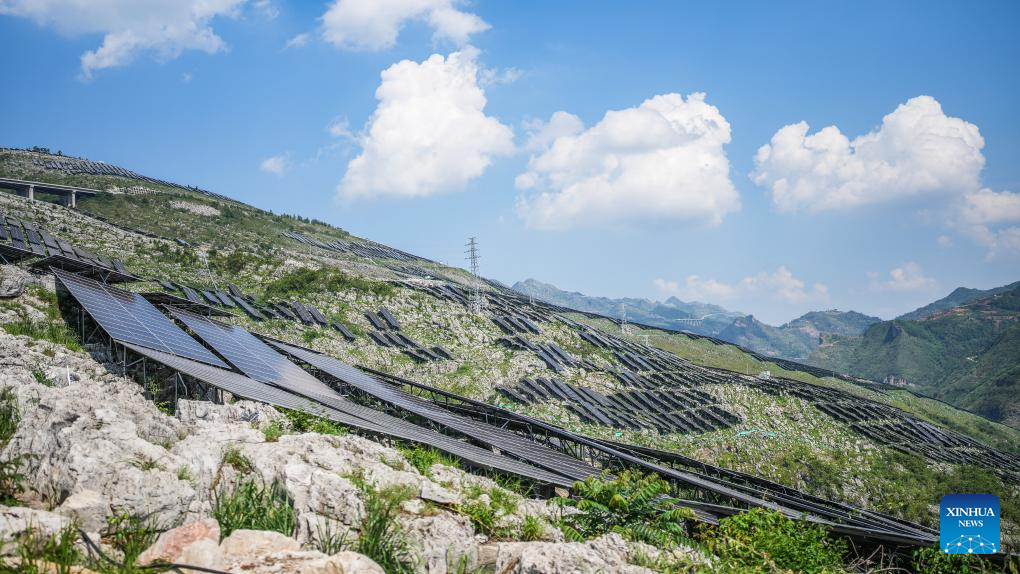
This photo taken on May 23, 2024 shows the Panjiang million-kilowatt photovoltaic base project in the Bouyei-Miao Autonomous County of Guanling, southwest China's Guizhou Province. In recent years, Guizhou has made significant progress in ecological construction, striving to transform ecological advantages into developmental strengths.
While actively developing green energy sources such as wind and solar power, Guizhou makes full use of the land beneath photovoltaic panels to cultivate crops, and meanwhile encourages farmers to engage in agricultural planting by leveraging diverse terrain and varied climate, an effort to enhance farmers' income.
Currently, Guizhou's forest coverage rate stands at 63.3 percent, and its green economy accounts for 48 percent of the province's overall economic composition. (Xinhua/Tao Liang)
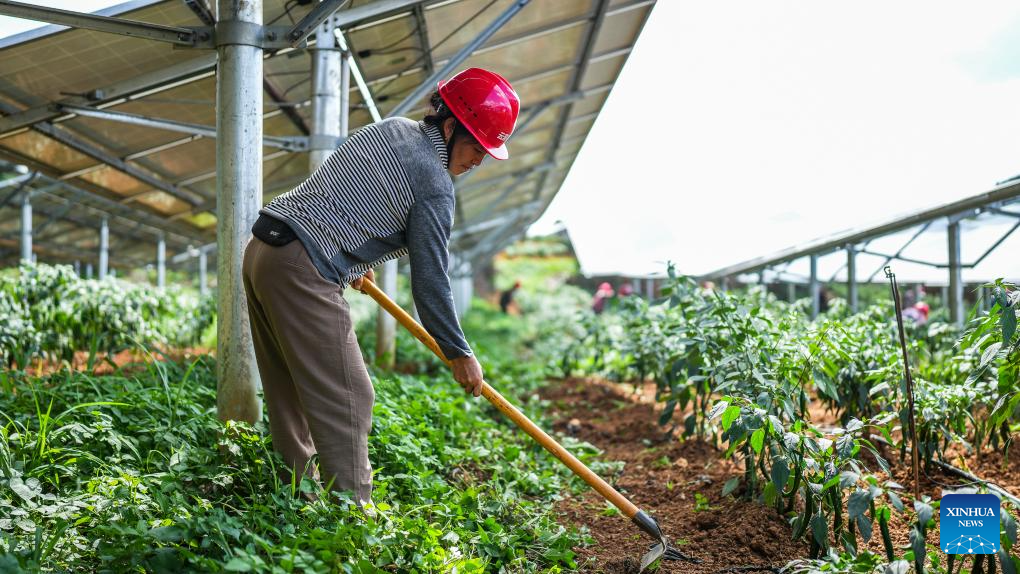
A farmer grows peppers under photovoltaic panels in Xinqiao Town of Anlong County, southwest China's Guizhou Province, July 5, 2023. In recent years, Guizhou has made significant progress in ecological construction, striving to transform ecological advantages into developmental strengths.
While actively developing green energy sources such as wind and solar power, Guizhou makes full use of the land beneath photovoltaic panels to cultivate crops, and meanwhile encourages farmers to engage in agricultural planting by leveraging diverse terrain and varied climate, an effort to enhance farmers' income.
Currently, Guizhou's forest coverage rate stands at 63.3 percent, and its green economy accounts for 48 percent of the province's overall economic composition. (Xinhua/Tao Liang)
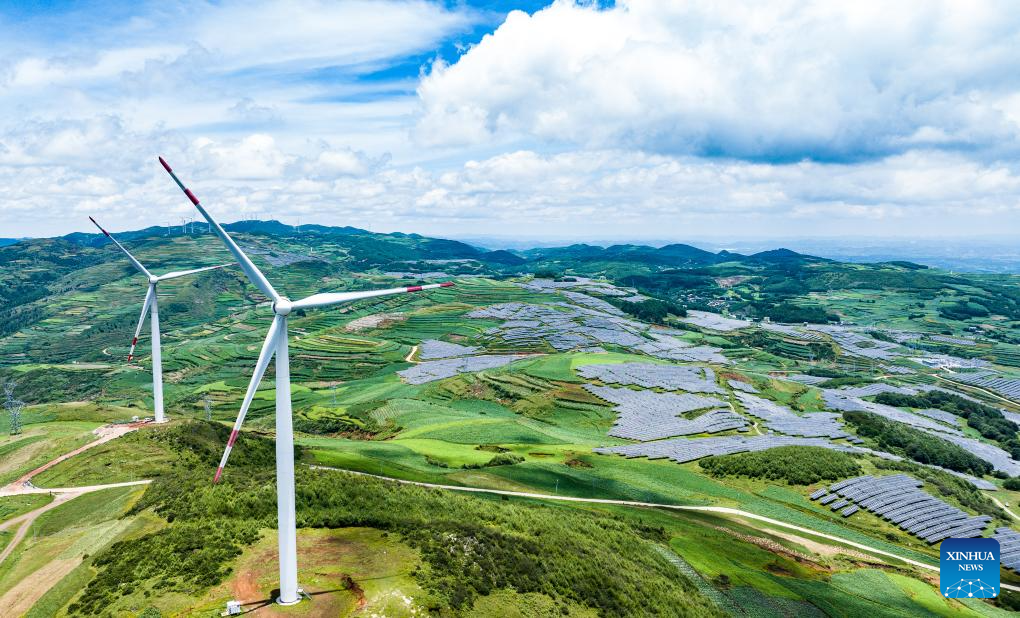
An aerial drone photo taken on July 3, 2025 shows a solar power station for agricultural use in the Yi-Hui-Miao Autonomous County of Weining, southwest China's Guizhou Province. In recent years, Guizhou has made significant progress in ecological construction, striving to transform ecological advantages into developmental strengths.
While actively developing green energy sources such as wind and solar power, Guizhou makes full use of the land beneath photovoltaic panels to cultivate crops, and meanwhile encourages farmers to engage in agricultural planting by leveraging diverse terrain and varied climate, an effort to enhance farmers' income.
Currently, Guizhou's forest coverage rate stands at 63.3 percent, and its green economy accounts for 48 percent of the province's overall economic composition. (Xinhua/Tao Liang)
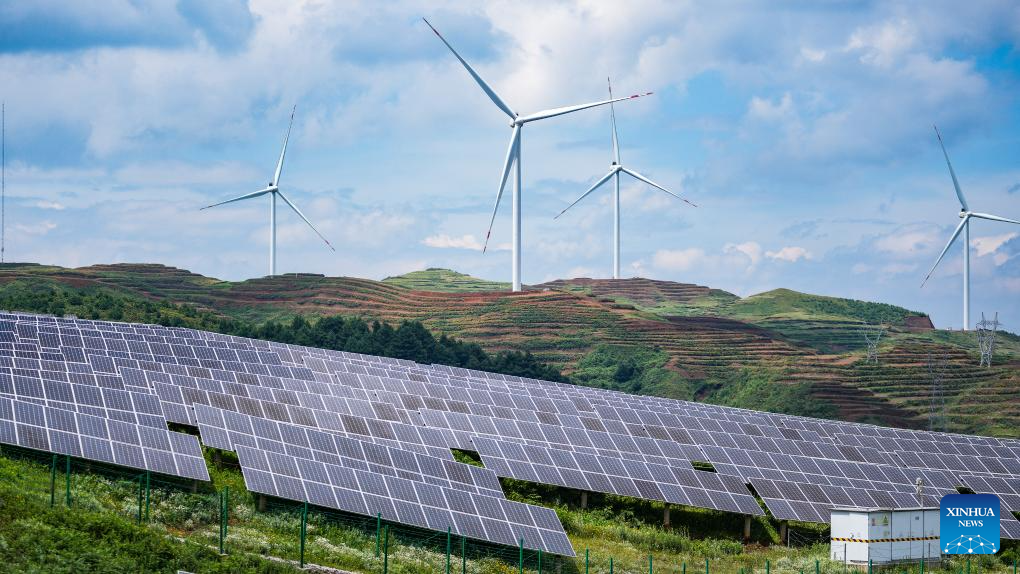
This photo shows photovoltaic panels of a solar power station for agricultural use in the Yi-Hui-Miao Autonomous County of Weining, southwest China's Guizhou Province, July 3, 2025. In recent years, Guizhou has made significant progress in ecological construction, striving to transform ecological advantages into developmental strengths.
While actively developing green energy sources such as wind and solar power, Guizhou makes full use of the land beneath photovoltaic panels to cultivate crops, and meanwhile encourages farmers to engage in agricultural planting by leveraging diverse terrain and varied climate, an effort to enhance farmers' income.
Currently, Guizhou's forest coverage rate stands at 63.3 percent, and its green economy accounts for 48 percent of the province's overall economic composition. (Xinhua/Tao Liang)
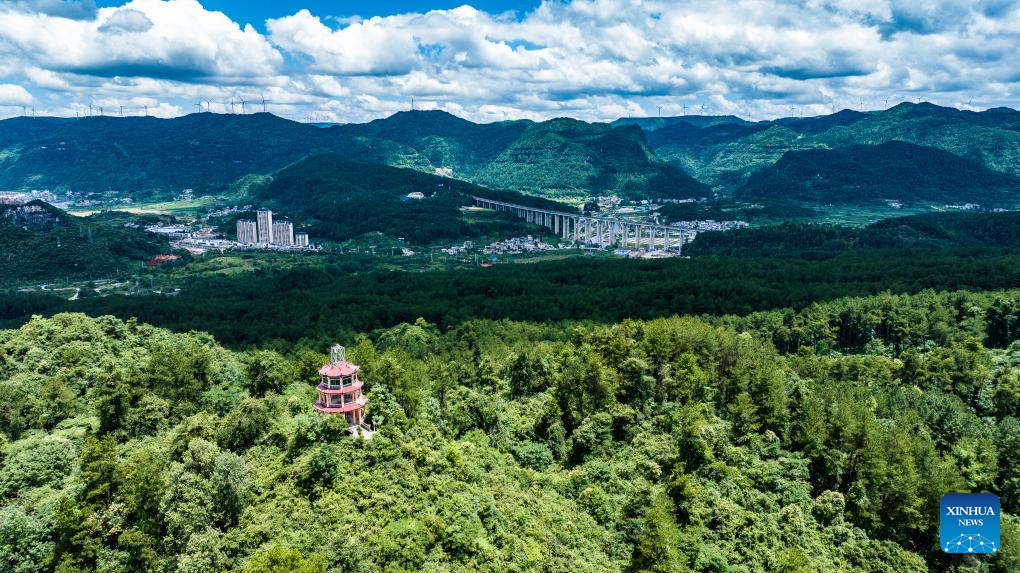
An aerial drone photo taken on July 4, 2025 shows a view of Longjiashan National Forest Park in Longli County, southwest China's Guizhou Province. In recent years, Guizhou has made significant progress in ecological construction, striving to transform ecological advantages into developmental strengths.
While actively developing green energy sources such as wind and solar power, Guizhou makes full use of the land beneath photovoltaic panels to cultivate crops, and meanwhile encourages farmers to engage in agricultural planting by leveraging diverse terrain and varied climate, an effort to enhance farmers' income.
Currently, Guizhou's forest coverage rate stands at 63.3 percent, and its green economy accounts for 48 percent of the province's overall economic composition. (Xinhua/Tao Liang)
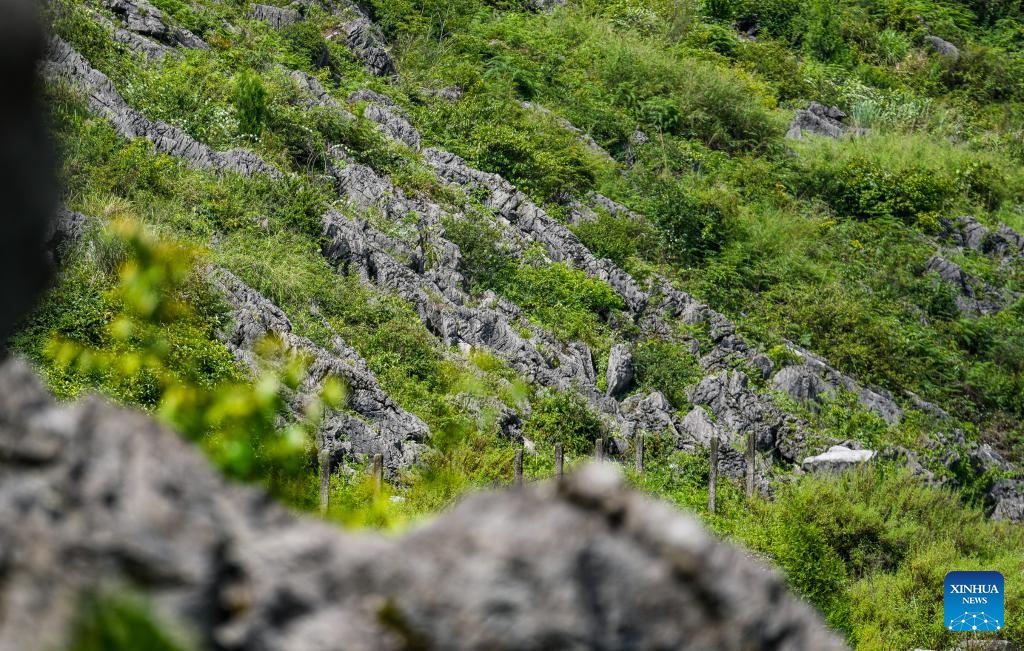
This photo taken on June 28, 2025 shows an area where ecological restoration measures are taken under a comprehensive management project of rocky desertification and biodiversity conservation in the Wumeng Mountain area in Liupanshui, southwest China's Guizhou Province. In recent years, Guizhou has made significant progress in ecological construction, striving to transform ecological advantages into developmental strengths.
While actively developing green energy sources such as wind and solar power, Guizhou makes full use of the land beneath photovoltaic panels to cultivate crops, and meanwhile encourages farmers to engage in agricultural planting by leveraging diverse terrain and varied climate, an effort to enhance farmers' income.
Currently, Guizhou's forest coverage rate stands at 63.3 percent, and its green economy accounts for 48 percent of the province's overall economic composition. (Xinhua/Tao Liang)
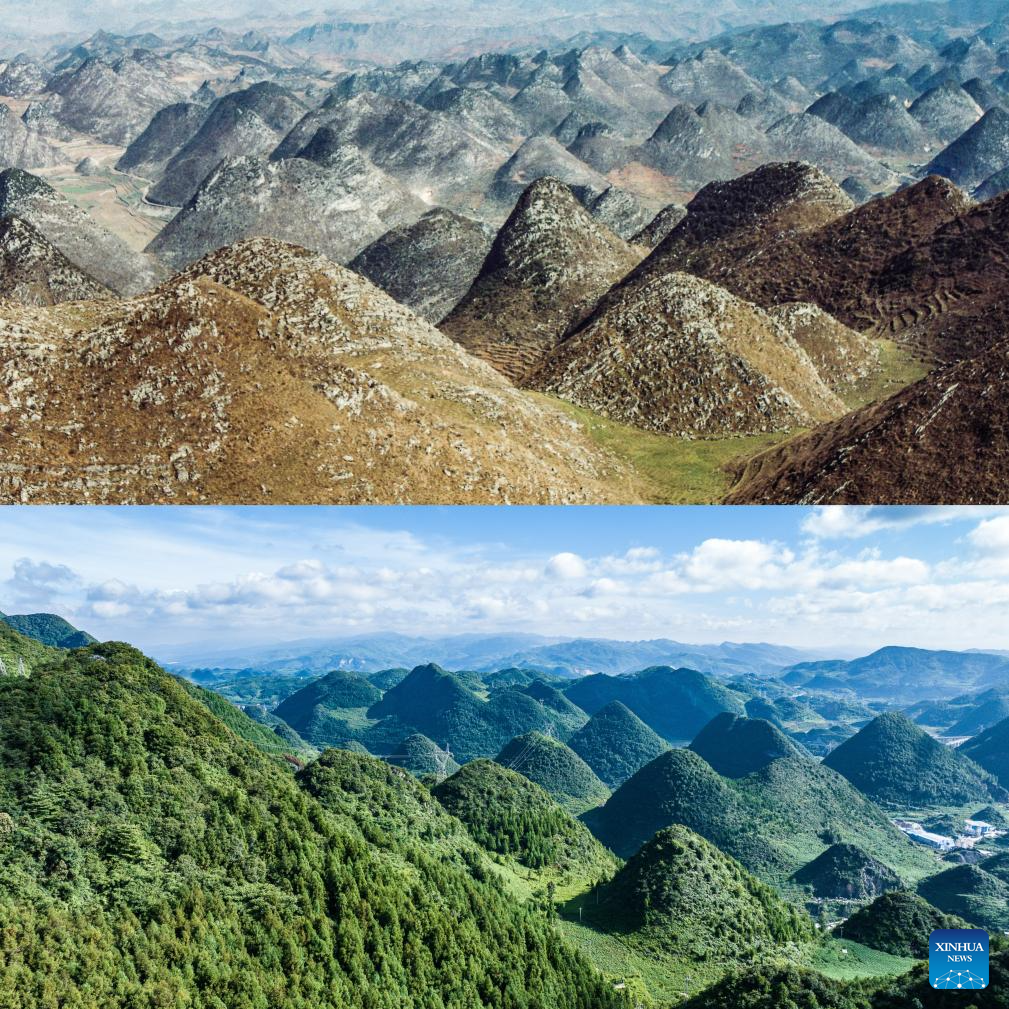
This combo photo shows the views of Meihua Mountain in Liupanshui, southwest China's Guizhou Province, in April 1996 (above, photo by Jiang Xingyuan) and on July 4, 2025 (below, photo by Xinhua photographer Tao Liang). In recent years, Guizhou has made significant progress in ecological construction, striving to transform ecological advantages into developmental strengths.
While actively developing green energy sources such as wind and solar power, Guizhou makes full use of the land beneath photovoltaic panels to cultivate crops, and meanwhile encourages farmers to engage in agricultural planting by leveraging diverse terrain and varied climate, an effort to enhance farmers' income.
Currently, Guizhou's forest coverage rate stands at 63.3 percent, and its green economy accounts for 48 percent of the province's overall economic composition. (Xinhua)
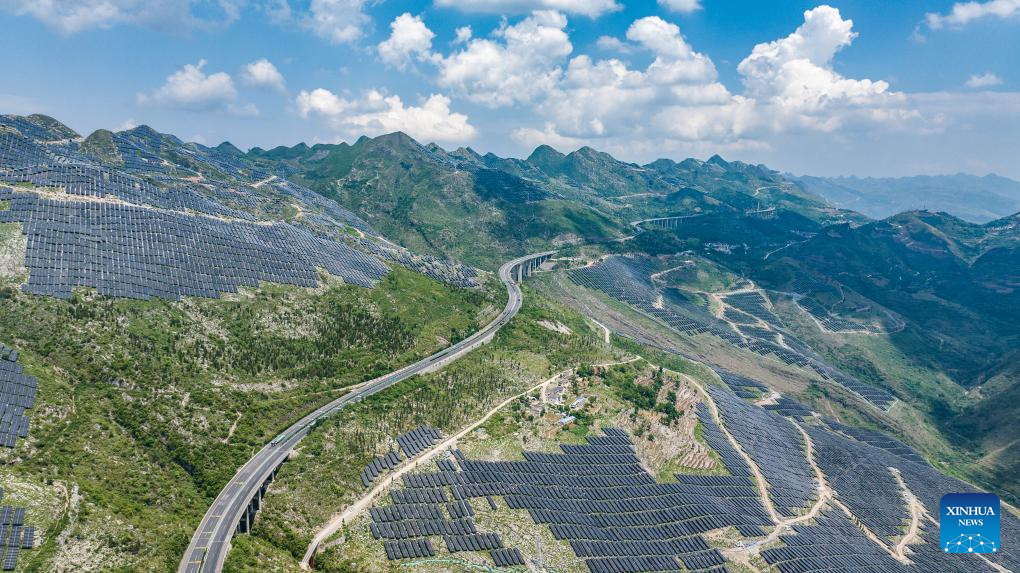
An aerial drone photo taken on May 23, 2024 shows the Panjiang million-kilowatt photovoltaic base project in the Bouyei-Miao Autonomous County of Guanling, southwest China's Guizhou Province. In recent years, Guizhou has made significant progress in ecological construction, striving to transform ecological advantages into developmental strengths.
While actively developing green energy sources such as wind and solar power, Guizhou makes full use of the land beneath photovoltaic panels to cultivate crops, and meanwhile encourages farmers to engage in agricultural planting by leveraging diverse terrain and varied climate, an effort to enhance farmers' income.
Currently, Guizhou's forest coverage rate stands at 63.3 percent, and its green economy accounts for 48 percent of the province's overall economic composition. (Xinhua/Tao Liang)
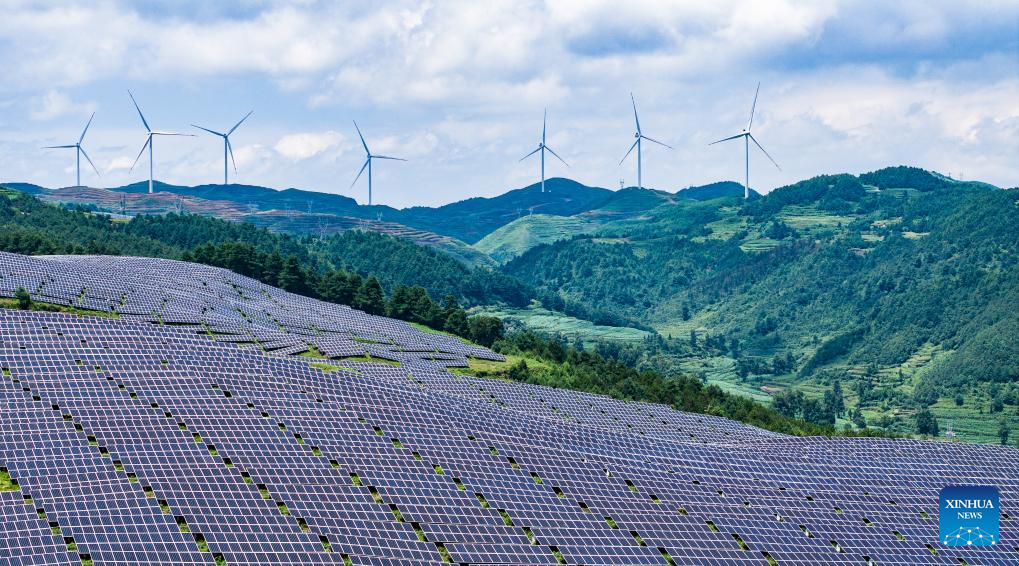
An aerial drone photo taken on July 3, 2025 shows a solar power station for agricultural use in the Yi-Hui-Miao Autonomous County of Weining, southwest China's Guizhou Province. In recent years, Guizhou has made significant progress in ecological construction, striving to transform ecological advantages into developmental strengths.
While actively developing green energy sources such as wind and solar power, Guizhou makes full use of the land beneath photovoltaic panels to cultivate crops, and meanwhile encourages farmers to engage in agricultural planting by leveraging diverse terrain and varied climate, an effort to enhance farmers' income.
Currently, Guizhou's forest coverage rate stands at 63.3 percent, and its green economy accounts for 48 percent of the province's overall economic composition. (Xinhua/Tao Liang)
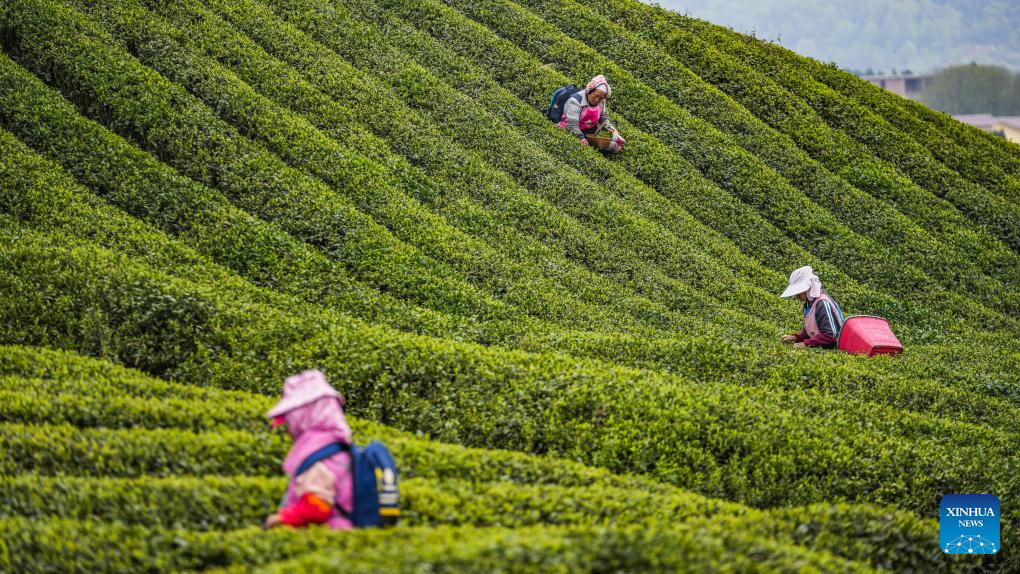
This drone photo taken on April 4, 2025 shows farmers picking tea leaves at a farm in Xixiu District of Anshun City, southwest China's Guizhou Province. In recent years, Guizhou has made significant progress in ecological construction, striving to transform ecological advantages into developmental strengths.
While actively developing green energy sources such as wind and solar power, Guizhou makes full use of the land beneath photovoltaic panels to cultivate crops, and meanwhile encourages farmers to engage in agricultural planting by leveraging diverse terrain and varied climate, an effort to enhance farmers' income.
Currently, Guizhou's forest coverage rate stands at 63.3 percent, and its green economy accounts for 48 percent of the province's overall economic composition. (Xinhua/Tao Liang)
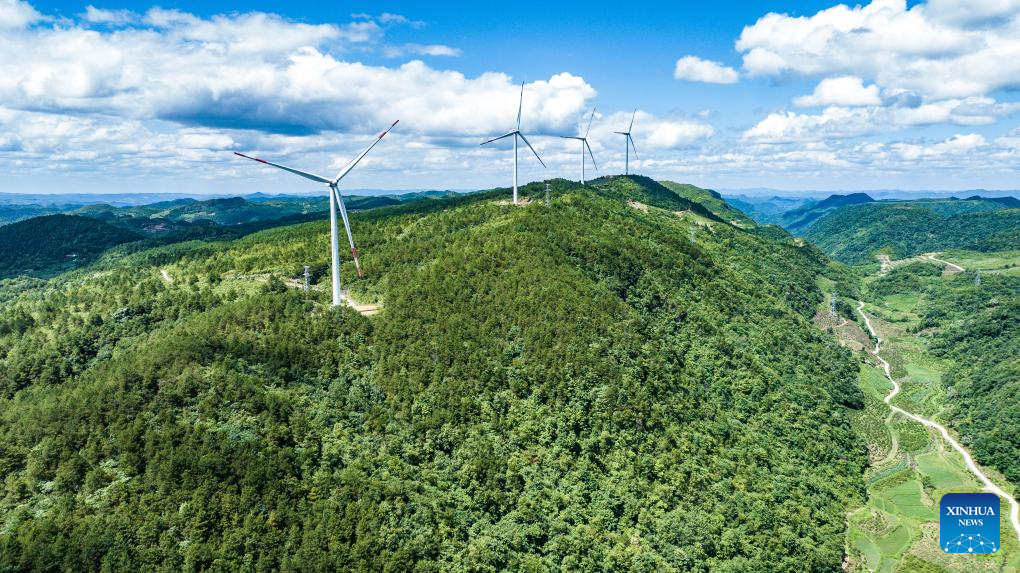
An aerial drone photo taken on July 4, 2025 shows wind turbines in Longli County, southwest China's Guizhou Province. In recent years, Guizhou has made significant progress in ecological construction, striving to transform ecological advantages into developmental strengths.
While actively developing green energy sources such as wind and solar power, Guizhou makes full use of the land beneath photovoltaic panels to cultivate crops, and meanwhile encourages farmers to engage in agricultural planting by leveraging diverse terrain and varied climate, an effort to enhance farmers' income.
Currently, Guizhou's forest coverage rate stands at 63.3 percent, and its green economy accounts for 48 percent of the province's overall economic composition. (Xinhua/Tao Liang)
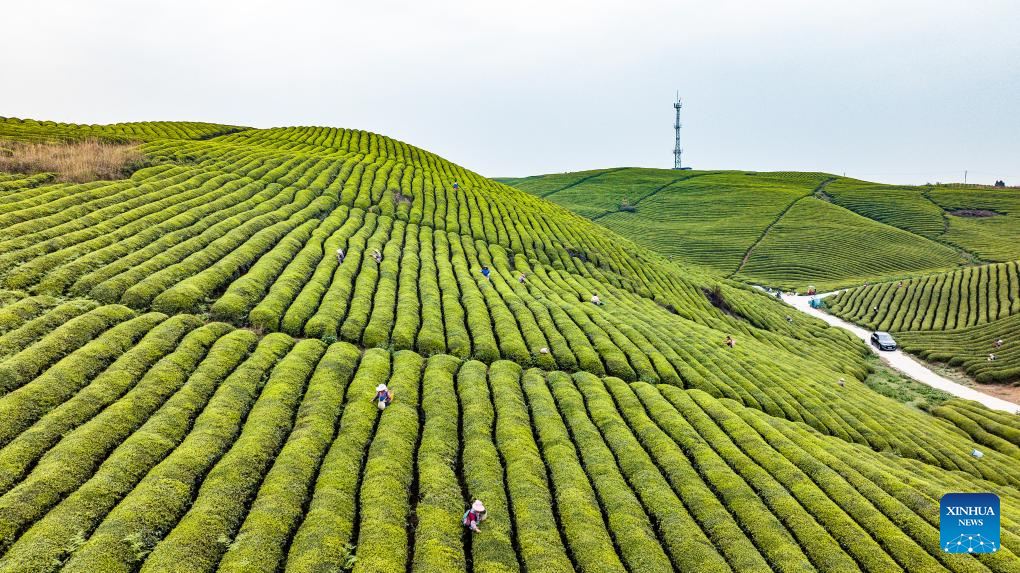
An aerial drone photo taken on April 4, 2025 shows farmers picking tea leaves at a farm in Xixiu District of Anshun, southwest China's Guizhou Province. In recent years, Guizhou has made significant progress in ecological construction, striving to transform ecological advantages into developmental strengths.
While actively developing green energy sources such as wind and solar power, Guizhou makes full use of the land beneath photovoltaic panels to cultivate crops, and meanwhile encourages farmers to engage in agricultural planting by leveraging diverse terrain and varied climate, an effort to enhance farmers' income.
Currently, Guizhou's forest coverage rate stands at 63.3 percent, and its green economy accounts for 48 percent of the province's overall economic composition. (Xinhua/Tao Liang)
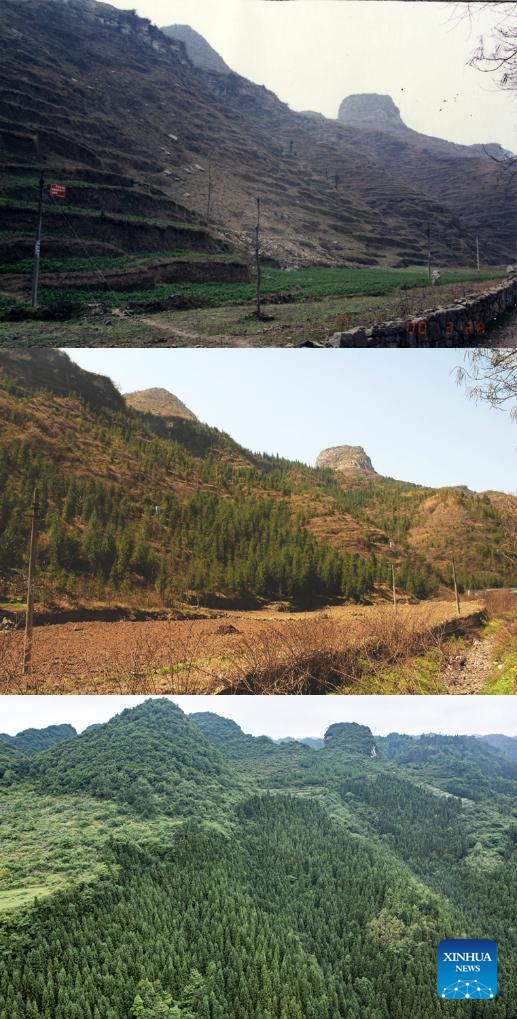
This combo photo shows the view of a sloped farmland in Chuanyan Village of Dafang County in Bijie, southwest China's Guizhou Province, before reforestation project (above, file photo provided by Dafang County forestry bureau), during reforestation project (middle, photo taken on March 14, 2009, provided by Dafang County forestry bureau), and on June 2, 2022 (below, photo by Xinhua photographer Tao Liang). In recent years, Guizhou has made significant progress in ecological construction, striving to transform ecological advantages into developmental strengths.
While actively developing green energy sources such as wind and solar power, Guizhou makes full use of the land beneath photovoltaic panels to cultivate crops, and meanwhile encourages farmers to engage in agricultural planting by leveraging diverse terrain and varied climate, an effort to enhance farmers' income.
Currently, Guizhou's forest coverage rate stands at 63.3 percent, and its green economy accounts for 48 percent of the province's overall economic composition. (Xinhua)
(Editor: wangsu )


